【BBC六分钟英语】枕头下放一本书睡觉有帮助吗?
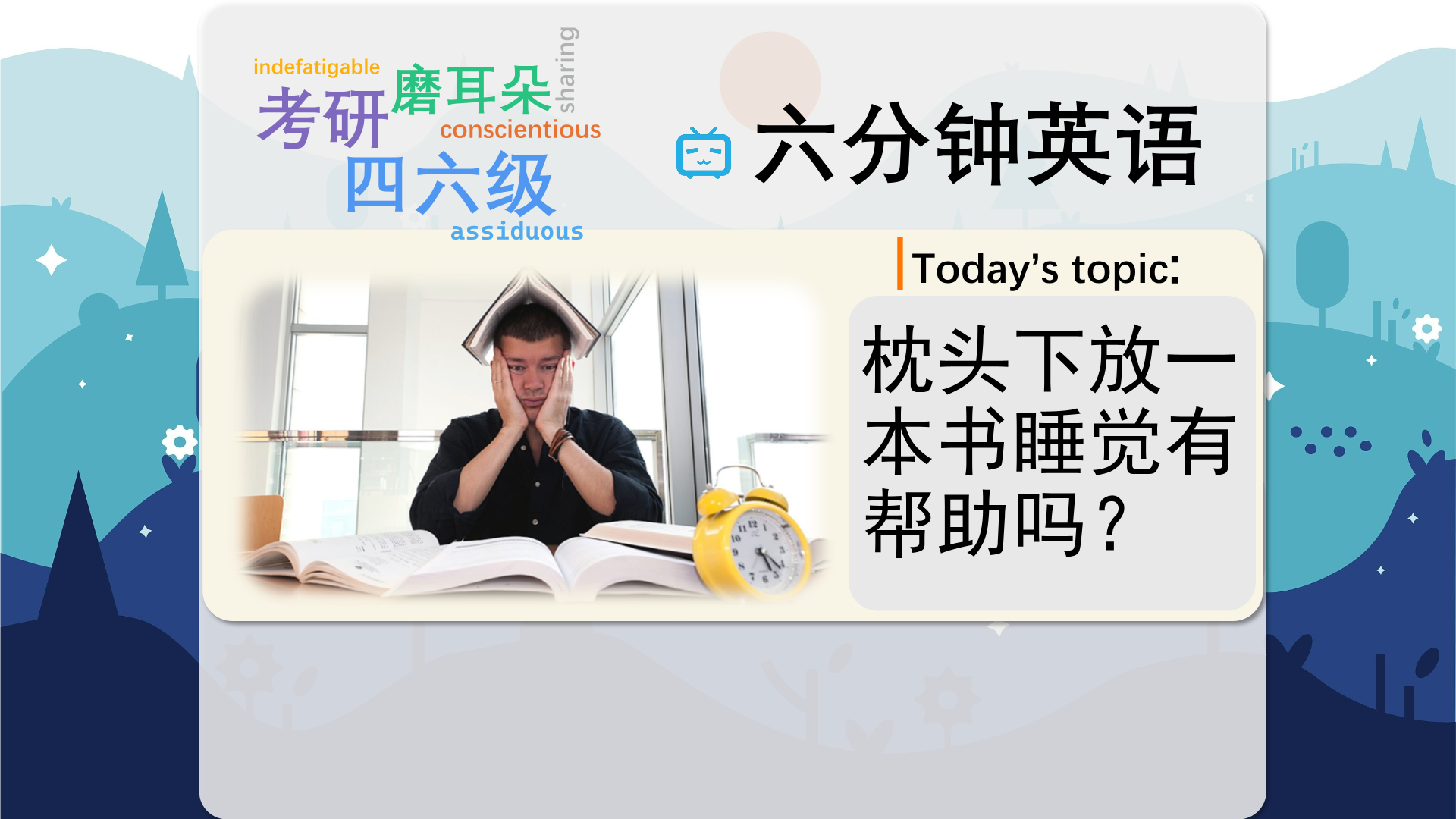
【英文脚本】
Alice
Hello and welcome to 6 Minute English. I’m Alice…
Rob
… And I’m Rob.
Alice
So, it’s nearly exam time again. And the subject of today’s show is how to prepare well for an exam.
Rob
I’ve got some great tips, actually, Alice. Alice Have you really? Can you remind me what grades you got at school?
Rob
Yes, well … [mumbles] …
Alice
So, you didn’t get very good grades. Rob I probably should’ve started revising earlier. But my learning strategies were very good.
Alice
Oh, really? Well, when you revise for an exam you study information you learned before. OK, Rob, I’d love to hear more about your learning strategies, but first here’s today’s quiz question for you. What’s the word for a system, such as use of special poems or rhymes to help you remember something? Is it … a) pneumatics b) mnemonics Or c) hypnotics?
Rob
I’ll go for b) mnemonics.
Alice
Well, we’ll find out whether you got the answer right or not later on in the show. Now, according to current scientific research, some study methods popular with students aren’t actually very effective.
Rob
Don’t tell me, putting your textbook under your pillow at night doesn’t work.
Alice
Did you try doing that, Rob?
Rob
Yes, I did, but without much success. Maybe I was using the wrong kind of pillow?!
Alice
Well, let’s talk about more conventional methods than the book-under-the-pillow one. These include summarizing, highlighting or underlining text to help you remember it… I do love a pack of highlighting pens, though.
Rob
Oh yes, me too. And actually highlighting text was one of my top tips. But I used to get so absorbed with the highlighting I’m not sure I was actually learning anything useful. My notebooks were works of art, though!
Alice
Yes, and that’s the point made by John Dunlosky, Professor of Psychology at Kent State University in the US, who says that you need to do more than just highlight information. You need to test yourself on it. Let’s hear from him now.
John Dunlosky, Professor of Psychology at Kent State University in the US
Students who can basically test themselves or try to retrieve material from their memory are going to learn that material in the long run a lot better. So for instance maybe you start by reading a textbook using your favourite highlighter and favourite colours, but then you go back and make flashcards of all the critical concepts and instead of just rereading those, you basically try to test yourselves on them.
Rob
Professor John Dunlosky there. So he says trying to memorise the material isn’t enough. You need to do something with it, for example, making flashcards of critical, or important – concepts and then testing yourself on them.
Alice
By repeatedly testing yourself on something, you strengthen the pathways between neurons, or nerve cells, in the brain. And the more often you do this, the easier it becomes to retrieve information.
Rob
And retrieve means to get something back.
Alice
That’s right. When you repeatedly test yourself over a longer period of time, for example, over months or weeks - this is called distributed practice, and psychologists believe this is a very effective way to learn.
Rob
It sounds like hard work, though, doesn’t it? I prefer the cramming method, which means to try and learn lots of information in a short period of time. For example, the night before the exam.
Alice
I don’t know, Rob. We don’t cram to learn other things, like music or dancing, or football or language learning. It’s far more effective to join a conversation class and practise speaking every week than to practise for hours in front of the mirror the night before your oral exam!
Rob
That’s a good point. In fact, I used to sing irregular French verbs to myself, every day in the shower for weeks before my French exam, and that helped me remember them more easily.
Alice
Excellent! Making different types of associations with what you’re trying to learn, for example, musical associations, is meant to be effective. Let’s listen now to Professor Dunlovsky talking about visual associations.
John Dunlosky, Professor of Psychology at Kent State University in the US
I would encourage students as they are reading to try and elaborate mentally using images, as they’re reading, to kind of develop a more vivid picture of what they’re reading. Again, that’ll help quite a bit for some kinds of studies, maybe history and so forth, and a little bit less so for more conceptual studies.
Rob
And if you elaborate on something, it means you add more information, in this case, mental pictures.
Alice
So, creating mental pictures is useful for some subjects, like history or languages. But conceptual subjects, ones based on abstract ideas rather than things, like maths, for example, it might not be so easy to associate ideas with pictures.
Rob
Now what about Albert Einstein? People say he was a very visual thinker.
Alice
Well, you’ve got me there, Rob. I don’t know the answer to that but I can give you the answer to today’s quiz question. I asked: What’s the word for a system, such as use of special poems or rhymes to help you remember something? Is it … a) pneumatics, b) mnemonics or c) hypnotics?
Rob
I said mnemonics.
Alice
And you were right!
Rob
Great!
Alice
Well done! Research on mnemonics suggests they are a good strategy for learning certain kinds of things, like how to spell difficult words. For example, the first letters of this sentence: ‘big elephants cause accidents under small elephants’ spells ‘because’. Now, do you think you can remember the words we heard today, Rob?
Rob
We heard: revise critical neurons retrieve distributed practice cramming elaborate conceptual
Alice
Well, that’s the end of today’s 6 Minute English. Remember to join us again soon!
Both
Bye.
【中英文双语脚本】
Alice(爱丽丝)
Hello and welcome to 6 Minute English. I’m Alice…
您好,欢迎来到 6 Minute English。我是 Alice…
Rob(罗伯)
… And I’m Rob.
…我是 罗伯。
Alice(爱丽丝)
So, it’s nearly exam time again. And the subject of today’s show is how to prepare well for an exam.
所以,又到了考试时间。今天节目的主题是如何为考试做好准备。
Rob(罗伯)
I’ve got some great tips, actually, Alice. Alice Have you really? Can you remind me what grades you got at school?
实际上,我有一些很棒的建议,Alice。Alice:你真的吗?你能告诉我你在学校的成绩是多少吗?
Rob(罗伯)
Yes, well … [mumbles] …
是的,嗯……[喃喃自语]……
Alice(爱丽丝)
So, you didn’t get very good grades. Rob I probably should’ve started revising earlier. But my learning strategies were very good.
所以,你的成绩不是很好。罗伯:我可能应该早点开始修改。但我的学习策略非常好。
Alice(爱丽丝)
Oh, really? Well, when you revise for an exam you study information you learned before. OK, Rob, I’d love to hear more about your learning strategies, but first here’s today’s quiz question for you. What’s the word for a system, such as use of special poems or rhymes to help you remember something? Is it … a) pneumatics b) mnemonics Or c) hypnotics?
真的?好吧,当你为考试复习时,你会学习你以前学到的信息。好的,罗伯,我很想听听更多关于你的学习策略的信息,但首先这是今天的测验问题。系统(例如使用特殊诗歌或押韵)来帮助您记住某事,这个词是什么?是吗。。。a) 气动 b) 助记词 还是 c) 催眠药?
Rob(罗伯)
I’ll go for b) mnemonics.
我会选择 b) 助记符。
Alice(爱丽丝)
Well, we’ll find out whether you got the answer right or not later on in the show. Now, according to current scientific research, some study methods popular with students aren’t actually very effective.
好吧,我们会在稍后的节目中找出你的答案是否正确。现在,根据目前的科学研究,一些受学生欢迎的学习方法实际上并不是很有效。
Rob(罗伯)
Don’t tell me, putting your textbook under your pillow at night doesn’t work.
别告诉我,晚上把课本放在枕头下是行不通的。
Alice(爱丽丝)
Did you try doing that, Rob?
你试过吗,罗伯?
Rob(罗伯)
Yes, I did, but without much success. Maybe I was using the wrong kind of pillow?!
是的,我做到了,但没有太大的成功。也许我用错了枕头?!
Alice(爱丽丝)
Well, let’s talk about more conventional methods than the book-under-the-pillow one. These include summarizing, highlighting or underlining text to help you remember it… I do love a pack of highlighting pens, though.
好吧,让我们谈谈比枕头下书本更传统的方法。这些包括摘要、突出显示或为文本加下划线以帮助您记住它……不过,我确实喜欢一包高光笔。
Rob(罗伯)
Oh yes, me too. And actually highlighting text was one of my top tips. But I used to get so absorbed with the highlighting I’m not sure I was actually learning anything useful. My notebooks were works of art, though!
哦,对了,我也是。实际上,突出显示文本是我最重要的建议之一。但我以前太专注于高亮显示了,我不确定我是否真的学到了什么有用的东西。不过,我的笔记本是艺术品!
Alice(爱丽丝)
Yes, and that’s the point made by John Dunlosky, Professor of Psychology at Kent State University in the US, who says that you need to do more than just highlight information. You need to test yourself on it. Let’s hear from him now.
是的,这就是美国肯特州立大学心理学教授 John Dunlosky 提出的观点,他说你需要做的不仅仅是突出信息。你需要测试一下自己。现在让我们听听他怎么说。
John Dunlosky, Professor of Psychology at Kent State University in the US(JohnDunlosky,美国肯特州立大学心理学教授)
Students who can basically test themselves or try to retrieve material from their memory are going to learn that material in the long run a lot better. So for instance maybe you start by reading a textbook using your favourite highlighter and favourite colours, but then you go back and make flashcards of all the critical concepts and instead of just rereading those, you basically try to test yourselves on them.
从长远来看,基本上可以测试自己或尝试从记忆中检索材料的学生将更好地学习这些材料。因此,例如,也许你从使用你最喜欢的荧光笔和最喜欢的颜色阅读一本教科书开始,但然后你回过头来制作所有关键概念的抽认卡,而不是仅仅重读这些概念,你基本上是尝试用它们来测试自己。
Rob(罗伯)
Professor John Dunlosky there. So he says trying to memorise the material isn’t enough. You need to do something with it, for example, making flashcards of critical, or important – concepts and then testing yourself on them.
John Dunlosky 教授在那里。所以他说,试图记住这些材料是不够的。你需要用它做点什么,例如,制作关键或重要概念的抽认卡,然后在这些概念上测试自己。
Alice(爱丽丝)
By repeatedly testing yourself on something, you strengthen the pathways between neurons, or nerve cells, in the brain. And the more often you do this, the easier it becomes to retrieve information.
通过反复测试自己在某件事上,您可以加强大脑中神经元或神经细胞之间的通路。您这样做的次数越多,检索信息就越容易。
Rob(罗伯)
And retrieve means to get something back.
而 retrieve 的意思是取回一些东西。
Alice(爱丽丝)
That’s right. When you repeatedly test yourself over a longer period of time, for example, over months or weeks - this is called distributed practice, and psychologists believe this is a very effective way to learn.
没错。当您在较长时间内反复测试自己时,例如数月或数周 - 这称为分布式练习,心理学家认为这是一种非常有效的学习方式。
Rob(罗伯)
It sounds like hard work, though, doesn’t it? I prefer the cramming method, which means to try and learn lots of information in a short period of time. For example, the night before the exam.
不过,这听起来很辛苦,不是吗?我更喜欢 cramming 方法,这意味着尝试在短时间内学习大量信息。例如,考试前一天晚上。
Alice(爱丽丝)
I don’t know, Rob. We don’t cram to learn other things, like music or dancing, or football or language learning. It’s far more effective to join a conversation class and practise speaking every week than to practise for hours in front of the mirror the night before your oral exam!
我不知道,罗伯。我们不会补习其他东西,比如音乐或舞蹈,或者足球或语言学习。参加会话课程并每周练习口语比在口试前一天晚上对着镜子练习几个小时要有效得多!
Rob(罗伯)
That’s a good point. In fact, I used to sing irregular French verbs to myself, every day in the shower for weeks before my French exam, and that helped me remember them more easily.
这是一个很好的观点。事实上,我曾经在法语考试前的几周里每天洗澡时对自己唱不规则的法语动词,这有助于我更容易记住它们。
Alice(爱丽丝)
Excellent! Making different types of associations with what you’re trying to learn, for example, musical associations, is meant to be effective. Let’s listen now to Professor Dunlovsky talking about visual associations.
非常好!与你正在努力学习的东西进行不同类型的联想,例如,音乐联想,是有效的。现在让我们听听 Dunlovsky 教授谈论视觉联想。
John Dunlosky, Professor of Psychology at Kent State University in the US(JohnDunlosky,美国肯特州立大学心理学教授)
I would encourage students as they are reading to try and elaborate mentally using images, as they’re reading, to kind of develop a more vivid picture of what they’re reading. Again, that’ll help quite a bit for some kinds of studies, maybe history and so forth, and a little bit less so for more conceptual studies.
我鼓励学生在阅读时尝试在脑海中使用图像进行详细说明,以更生动地描绘他们正在阅读的内容。同样,这对某些类型的研究有很大帮助,也许是历史等,而对于更多的概念研究则不太有帮助。
Rob(罗伯)
And if you elaborate on something, it means you add more information, in this case, mental pictures.
如果你详细说明某件事,这意味着你添加了更多信息,在这种情况下,是心理图片。
Alice(爱丽丝)
So, creating mental pictures is useful for some subjects, like history or languages. But conceptual subjects, ones based on abstract ideas rather than things, like maths, for example, it might not be so easy to associate ideas with pictures.
因此,创建心理图片对某些学科很有用,例如历史或语言。但是概念性科目,即基于抽象思想而不是数学等事物的科目,可能并不容易将思想与图片联系起来。
Rob(罗伯)
Now what about Albert Einstein? People say he was a very visual thinker.
那么阿尔伯特·爱因斯坦呢?人们说他是一个非常注重视觉的思考者。
Alice(爱丽丝)
Well, you’ve got me there, Rob. I don’t know the answer to that but I can give you the answer to today’s quiz question. I asked: What’s the word for a system, such as use of special poems or rhymes to help you remember something? Is it … a) pneumatics, b) mnemonics or c) hypnotics?
好吧,你把我带到了那里,罗伯。我不知道这个问题的答案,但我可以给你今天测验问题的答案。我问道:系统这个词是什么,比如使用特殊的诗歌或押韵来帮助你记住某件事?是吗。。。a) 气动,b) 助记词还是 c) 催眠?
Rob(罗伯)
I said mnemonics.
我说助记符。
Alice(爱丽丝)
And you were right!
你是对的!
Rob(罗伯)
Great!
太好了!
Alice(爱丽丝)
Well done! Research on mnemonics suggests they are a good strategy for learning certain kinds of things, like how to spell difficult words. For example, the first letters of this sentence: ‘big elephants cause accidents under small elephants’ spells ‘because’. Now, do you think you can remember the words we heard today, Rob?
干的好!对助记词的研究表明,它们是学习某些类型事物的好方法,例如如何拼写困难的单词。例如,这句话的第一个字母 ‘big elephants cause accidents under small elephants’ 拼写为 ‘because’。现在,你觉得你还记得我们今天听到的话吗,罗伯?
Rob(罗伯)
We heard: revise critical neurons retrieve distributed practice cramming elaborate conceptual
我们听说:修正关键神经元检索分布式练习 填鸭式 详细概念
Alice(爱丽丝)
Well, that’s the end of today’s 6 Minute English. Remember to join us again soon!
好了,今天的六分钟 English 到此结束。记得很快再次加入我们!
Both(双)
Bye.
再见。

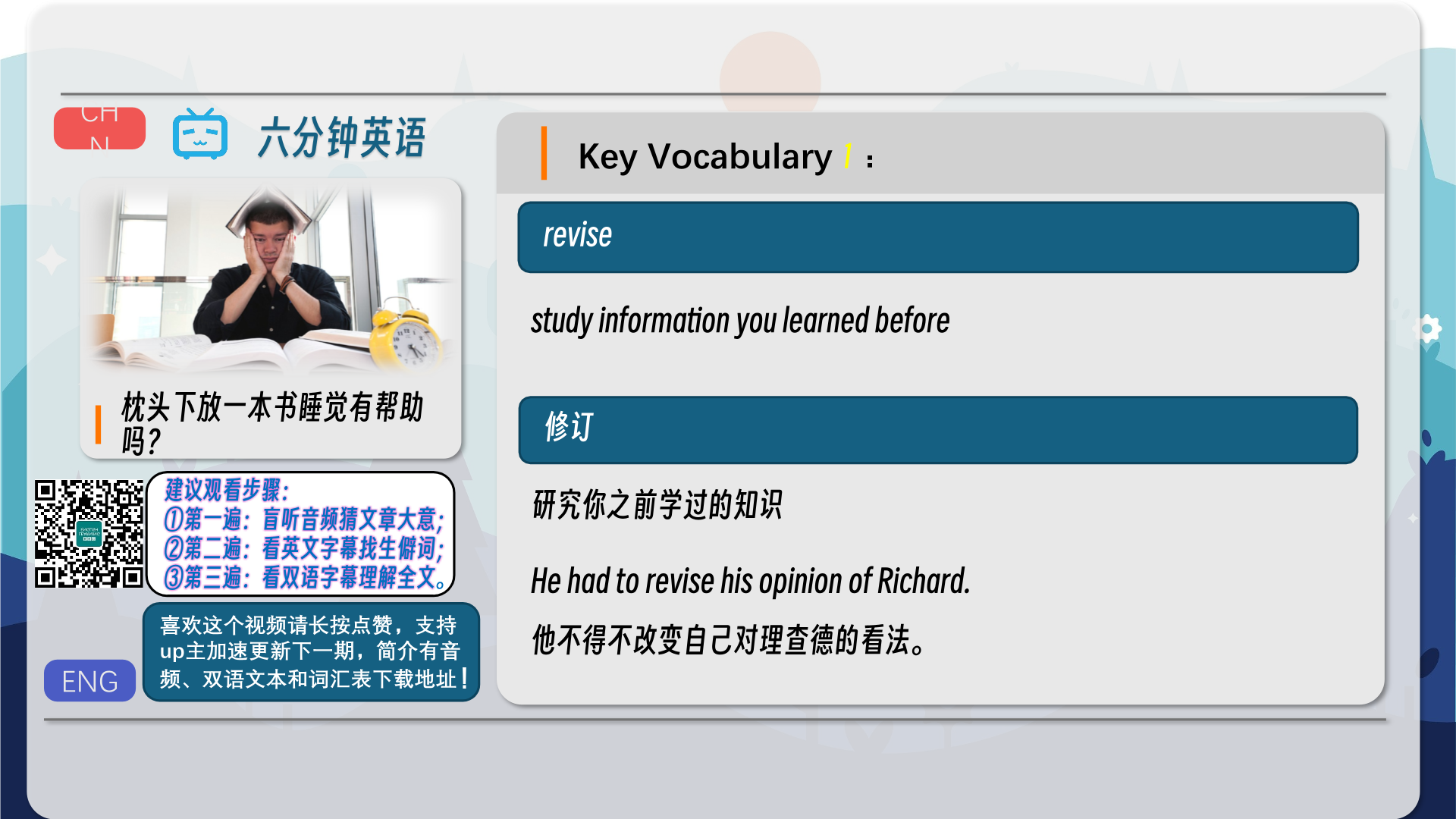
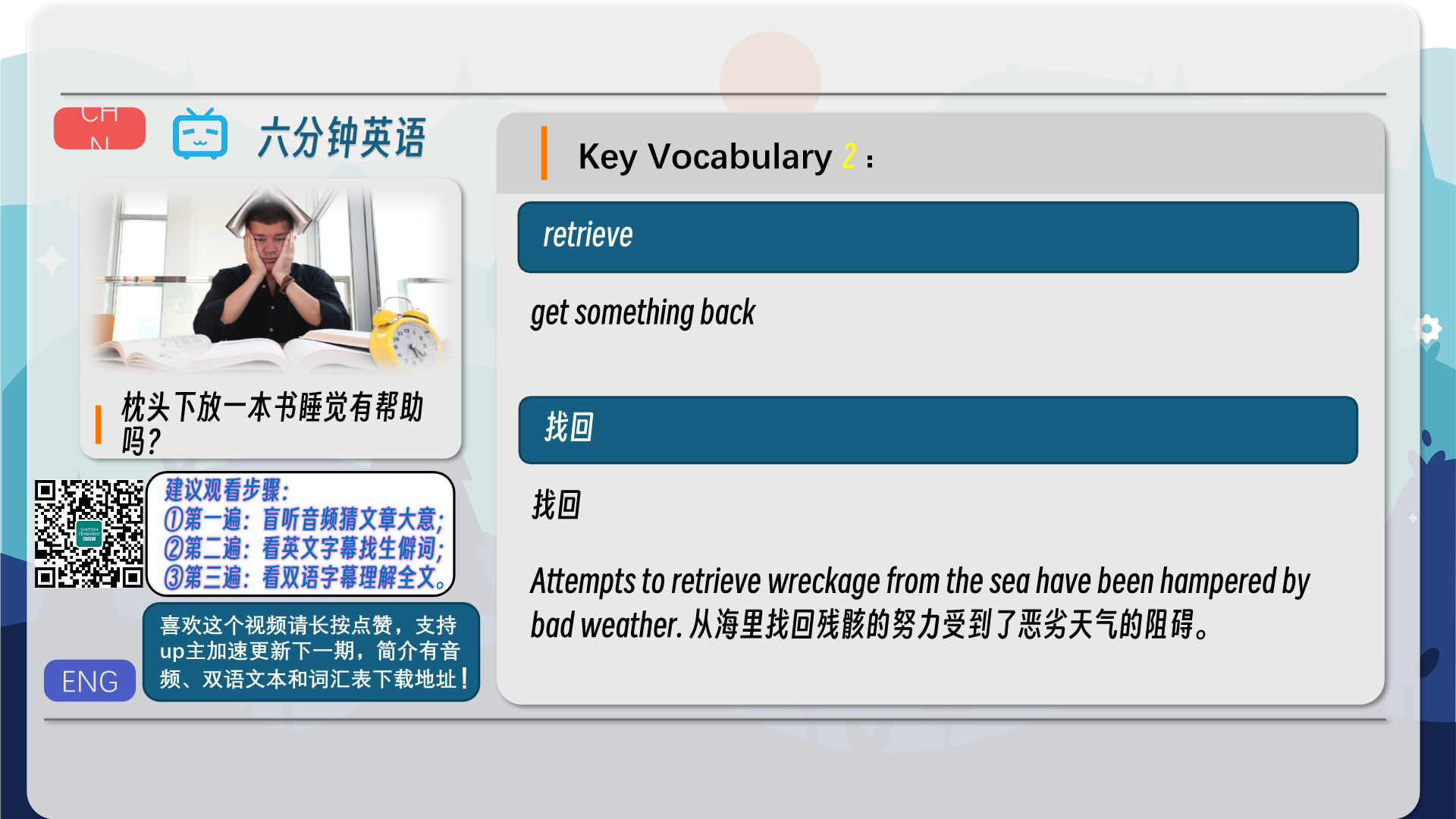
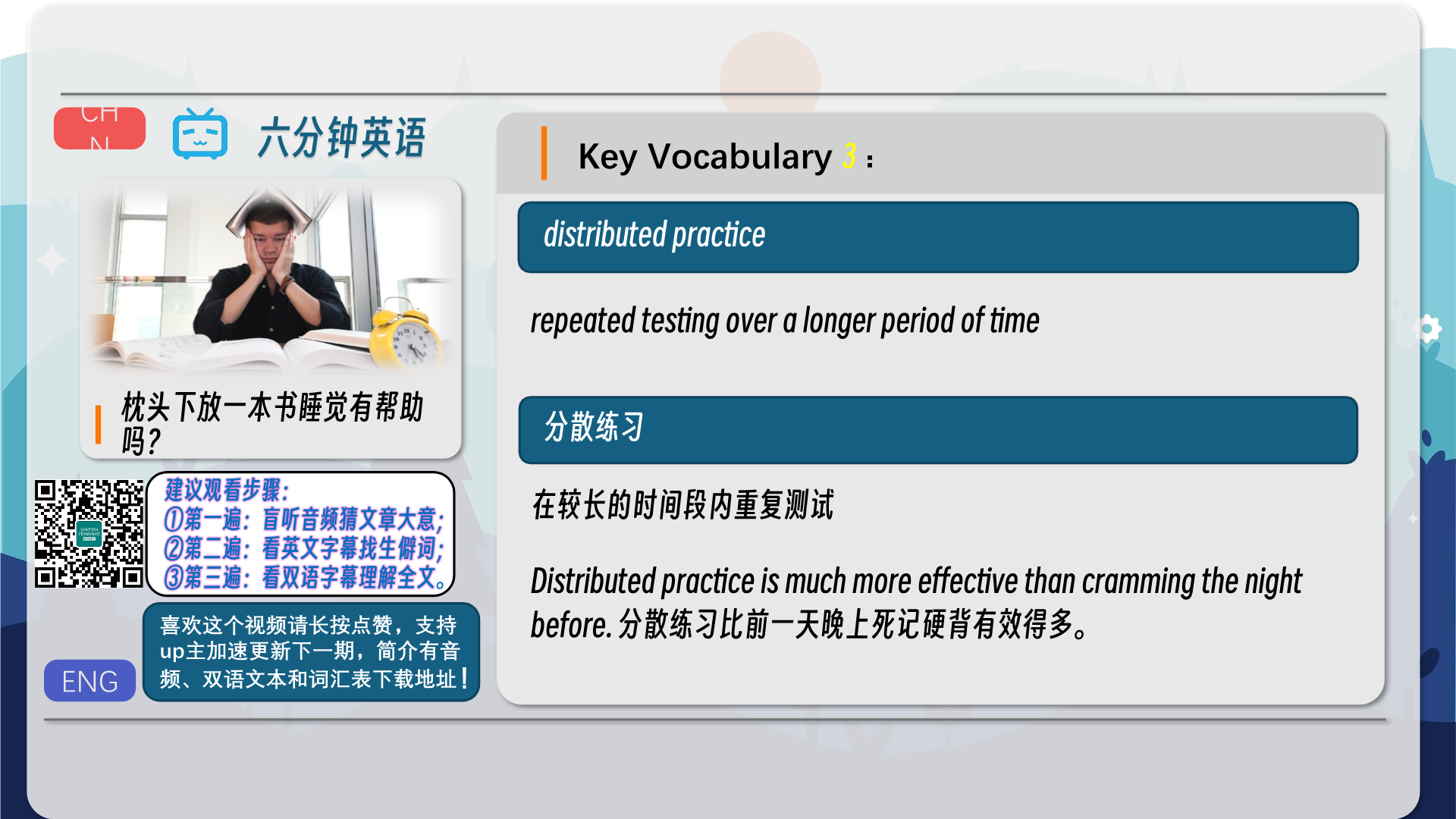
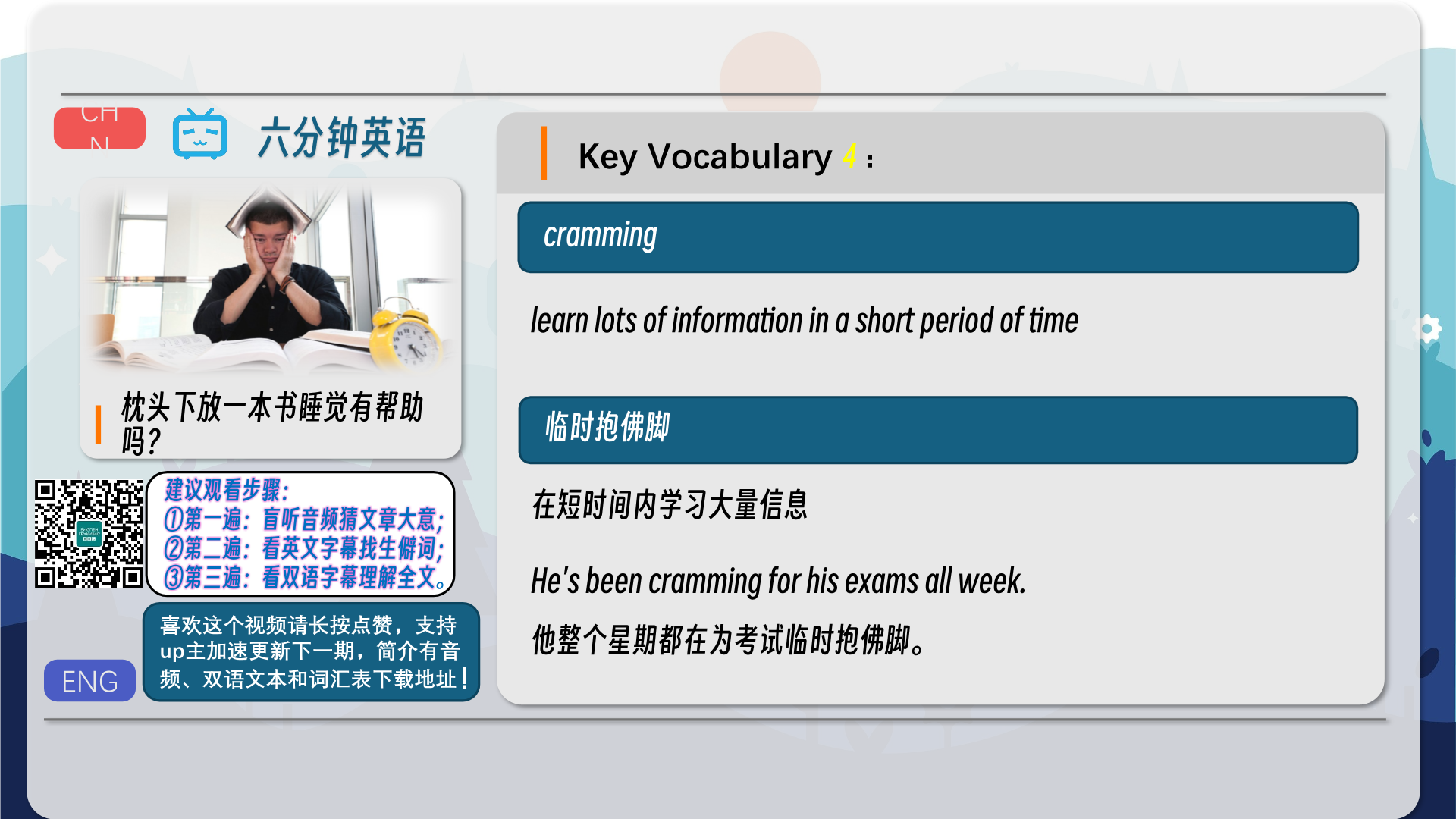
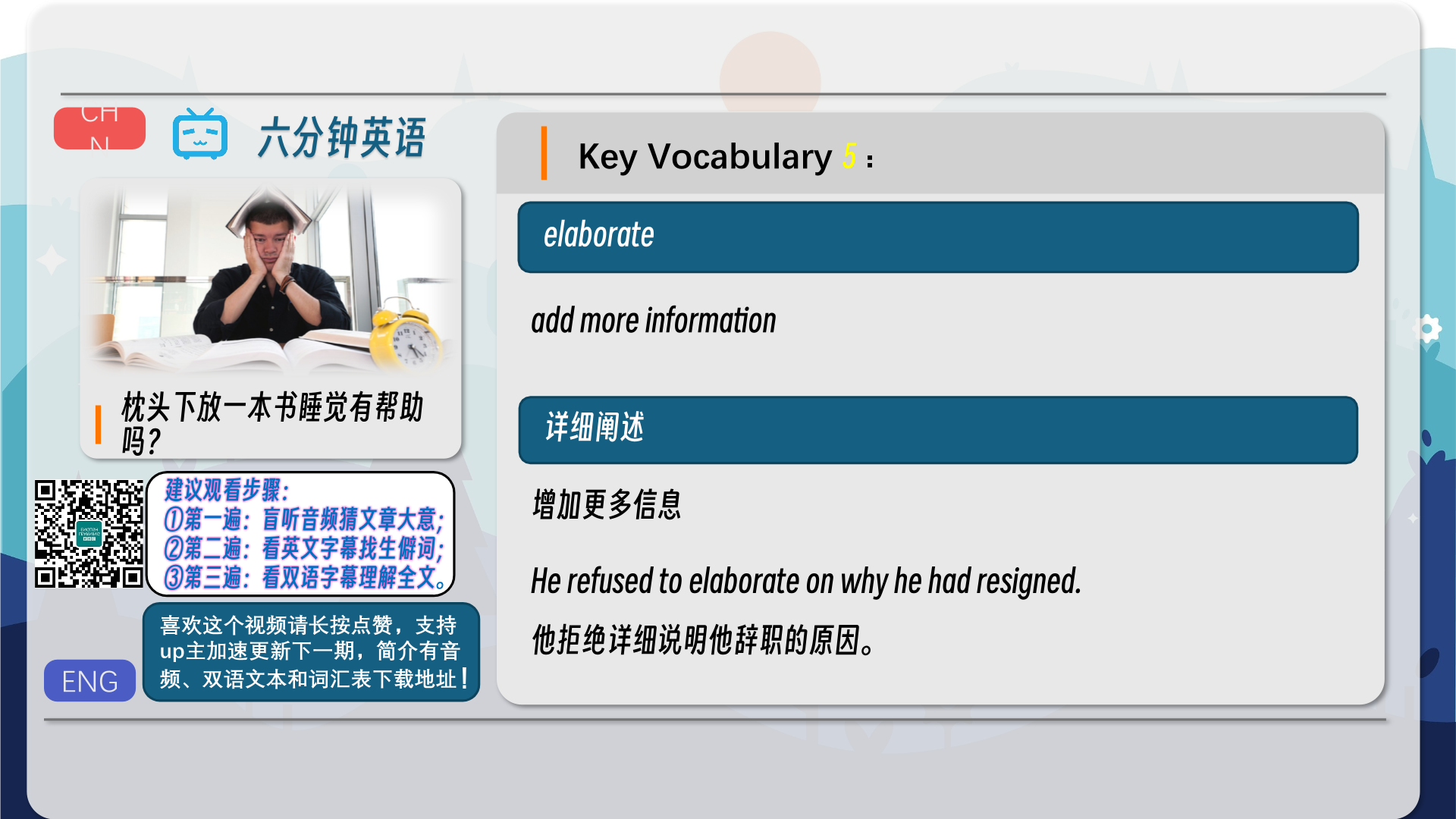
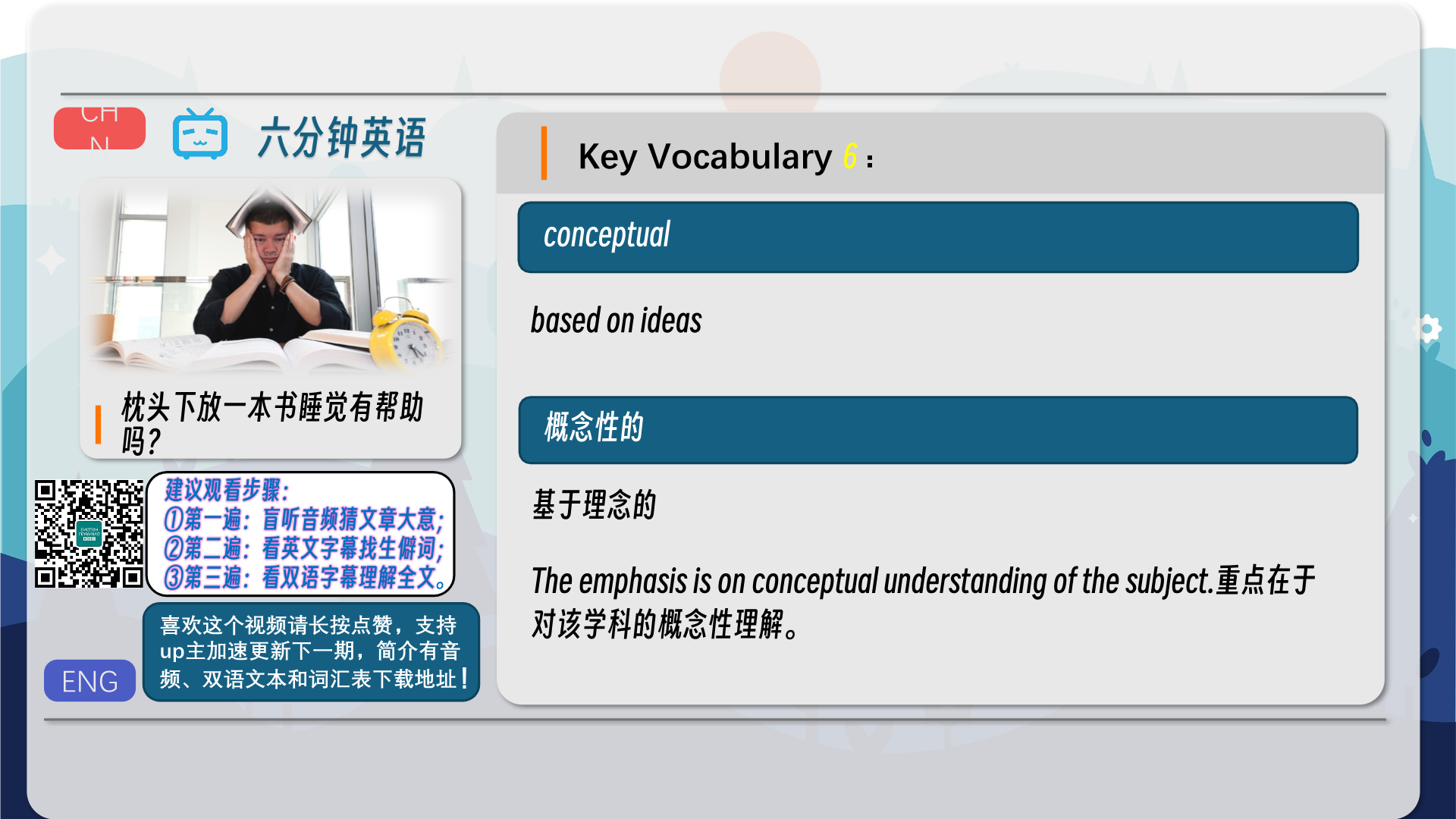
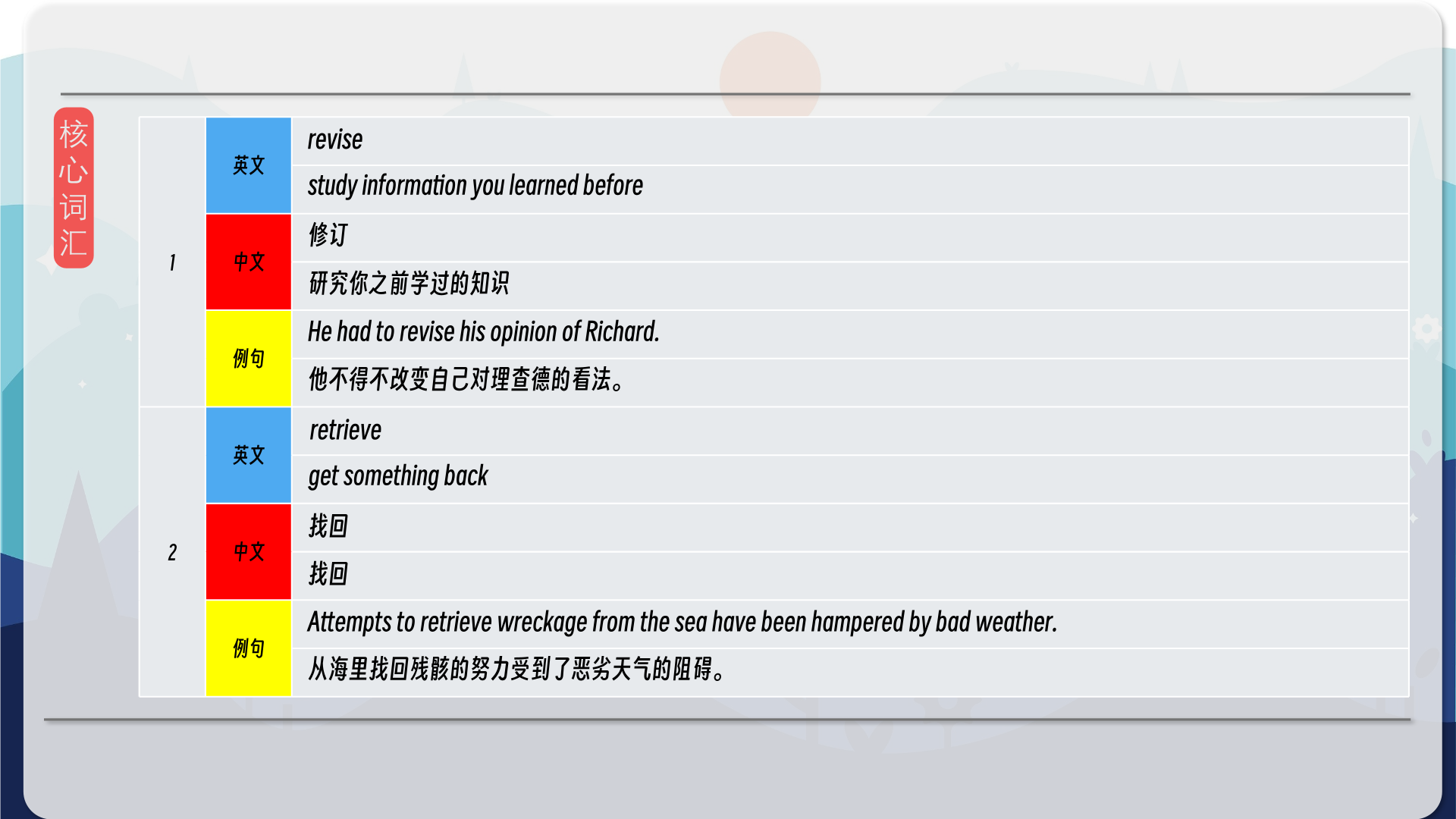
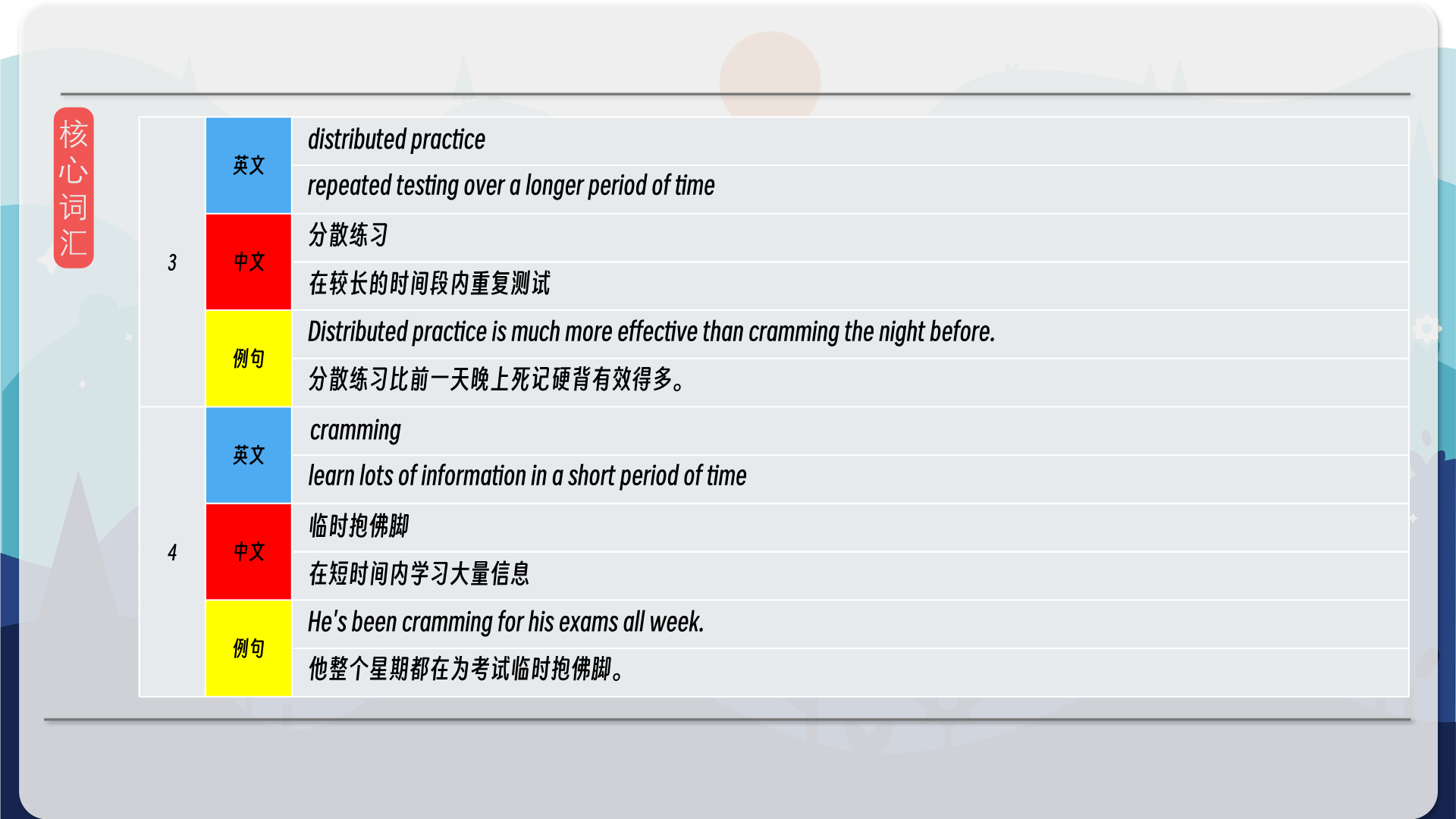
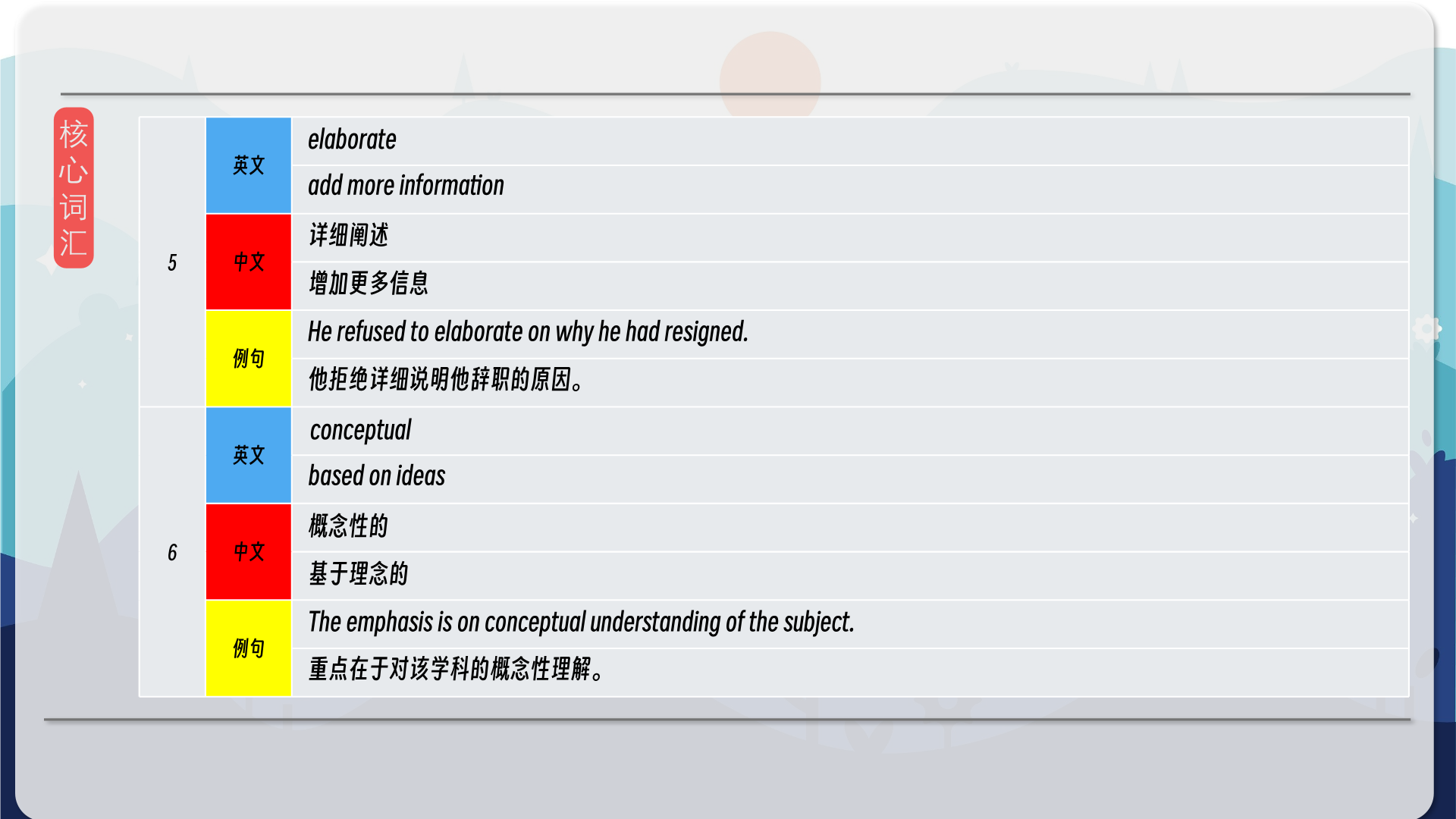
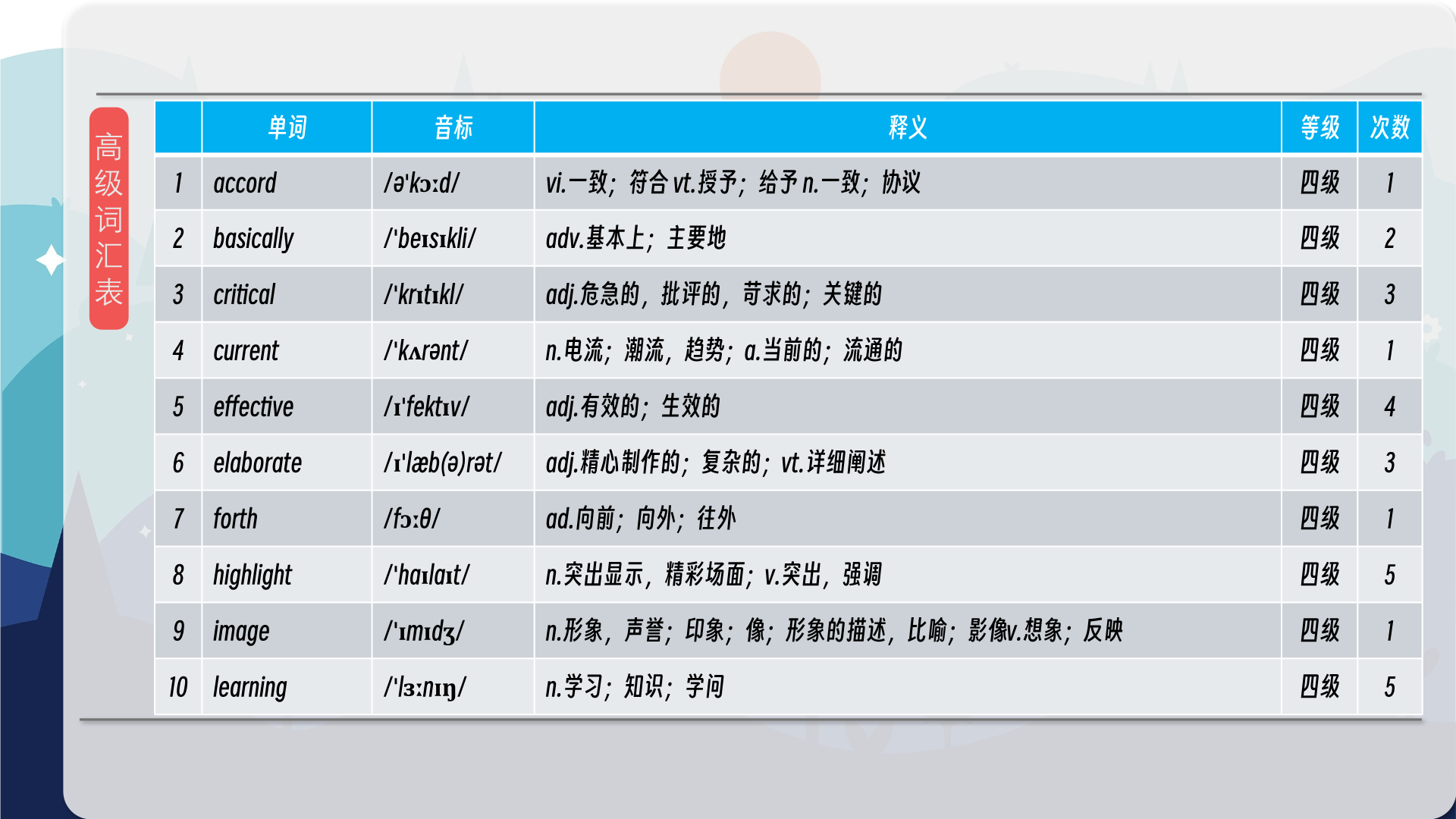
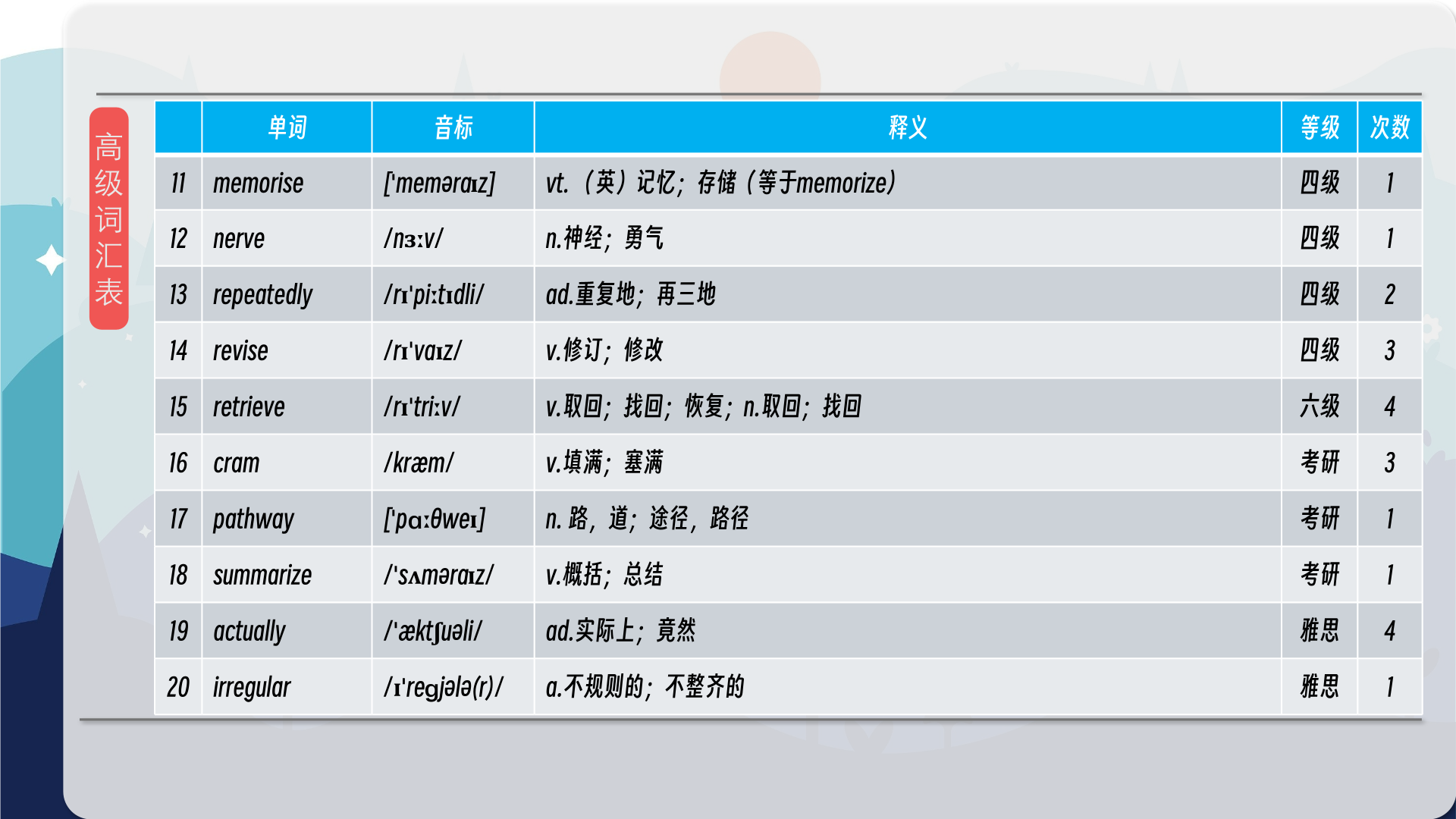
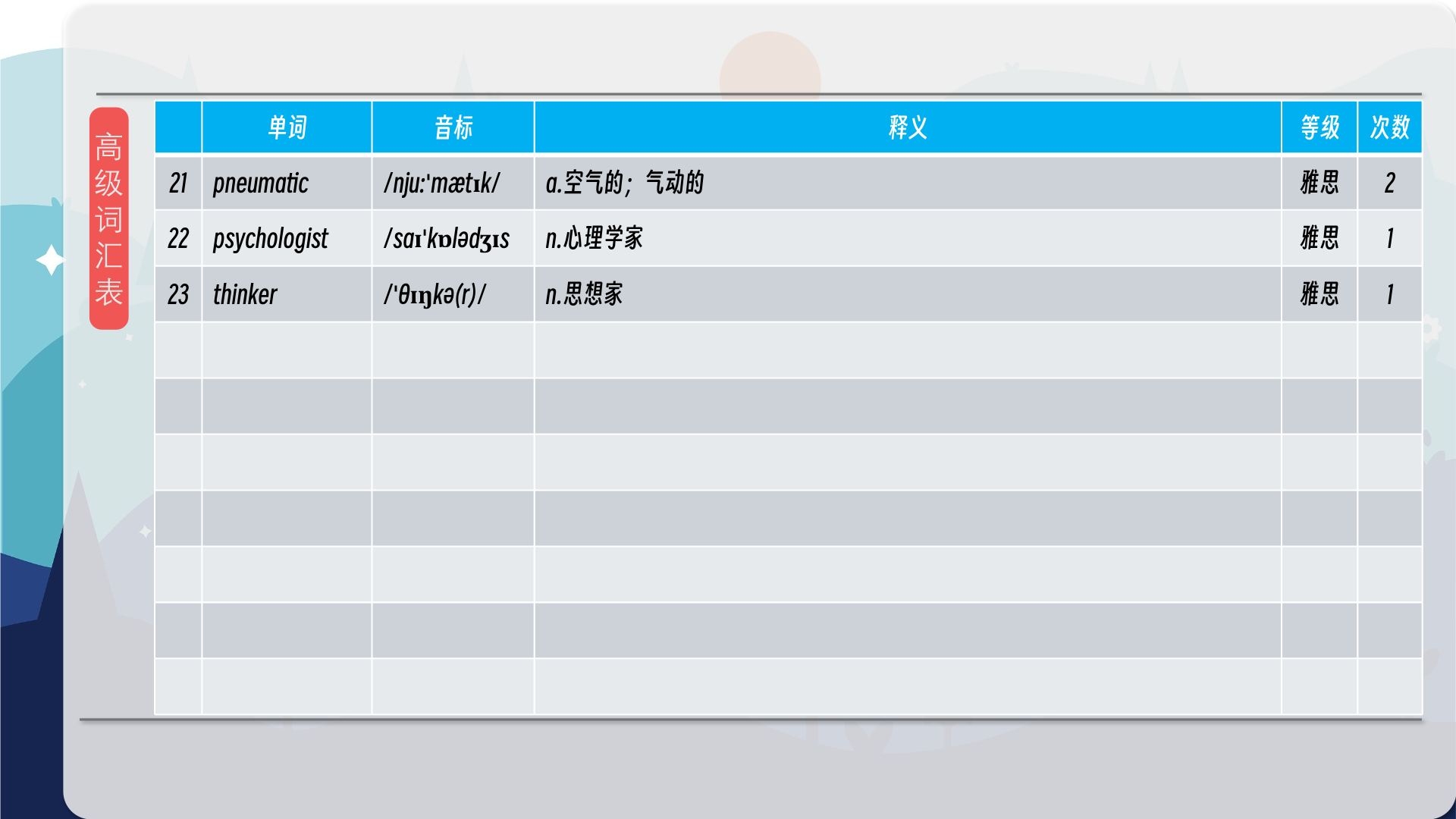

【核心词汇】
revise
study information you learned before
修订
研究你之前学过的知识
He had to revise his opinion of Richard.
他不得不改变自己对理查德的看法。
retrieve
get something back
找回
找回
Attempts to retrieve wreckage from the sea have been hampered by bad weather.
从海里找回残骸的努力受到了恶劣天气的阻碍。
distributed practice
repeated testing over a longer period of time
分散练习
在较长的时间段内重复测试
Distributed practice is much more effective than cramming the night before.
分散练习比前一天晚上死记硬背有效得多。
cramming
learn lots of information in a short period of time
临时抱佛脚
在短时间内学习大量信息
He’s been cramming for his exams all week.
他整个星期都在为考试临时抱佛脚。
elaborate
add more information
详细阐述
增加更多信息
He refused to elaborate on why he had resigned.
他拒绝详细说明他辞职的原因。
conceptual
based on ideas
概念性的
基于理念的
The emphasis is on conceptual understanding of the subject.
重点在于对该学科的概念性理解。
在公众号里输入6位数字,获取【对话音频、英文文本、中文翻译、核心词汇和高级词汇表】电子档,6位数字【暗号】在文章的最后一张图片,如【220728】,表示22年7月28日这一期。公众号没有的文章说明还没有制作相关资料。年度合集在B站【六分钟英语】工房获取,每年共计300+文档,感谢支持!